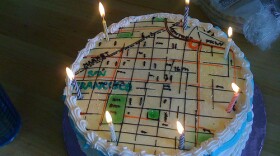Economic solutions
New York's two gubernatorial candidates are talking about how they'd create jobs and restore the economic health of the state. The Democrat and Chronicle's Vote Up blog reports that Cuomo would make economic development agencies more responsible for the tax dollars they spend to recruit business. And Paladino says he'd incentivize manufacturers to stay in the region by cutting taxes.
In cities across upstate, cutting is the name of the game as mayors struggle to balance the budget for next year. In Schnectady, the Times-Union reports that the mayor is proposing a fee for simply being on the street, based on your linear footage. It's meant to cover the cost of snow removal and other street cleaning.
Non-profits are also feeling the pinch, as the bad news stories mount in the Times-Union. The paper has a profile of hard times for the "Veggie Mobile," which delivers produce in poor neighbhorhoods. Like many nonprofits, it's waiting on state funds to come through.
Bad news
The Buffalo News has two stories about data that shows that the recession's effects are still being felt. Home sales in western New York dropped by nearly half over the previous year, after the federal tax credit for buying a home ended. And manufacturers in the region bought less last month, leading some to fear that purchasing will continue to fall.
Moving up and moving out
In Rochester, Monroe Community College says it's considering using Bausch + Lomb's tower downtown as the site for a new urban campus. From the Democrat and Chronicle:
B+L officials had announced in June that they intend to sell the 342,000-square-foot building and, by 2013, consolidate the company's Rochester operations at its Optics Center at 1400 N. Goodman St.
The Buffalo News reports that the Buffalo Niagara Convention Center has spiffed itself up, and is hoping to boost tourism and convention business spending in the region:
The floor was resurfaced; 32,000 square feet of new carpeting was installed; and 1,200 banquet chairs were reconditioned and reupholstered, said Paul Murphy, the facility manager. New wall coverings were installed, with acoustical treatments and LED accent lighting.
Higher education
The Times-Union reports that the University at Albany is cutting foreign language programs, as well as classics and theater. Au revoir Francais, ciao Italian and do svidaniya Russian.
Another farewell in higher ed: a man in Binghamton has been arrested for masquerading as a Binghamton University student. The Press & Sun-Bulletin reports that he apparently served on several student organizations before getting busted.
(Not) paying up
The Press & Sun-Bulletin reports that a third of property in the city of Binghamton is exempt from property taxes for one reason or another. The amount of revenue the city's missing out on? More than $625 million. The paper also has a story that illustrates the report: a developer is looking for a payment-in-lieu-of-taxes agreement to turn an old mall into student housing. He says he needs the tax break to keep the project alive.
Greening the military
American military forces are turning to alternative fuels, according to the New York Times. Not because they're treehuggers mind you - rather because it makes sense defensively, in the wake of the bombings of fuel supplies in Pakistan.
Hydrofracking forum
There's another forum about natural gas hydrofracturing in the Marcellus shale scheduled in Binghamton, according to the Press & Sun-Bulletin. The last one drew some 400 people, and during the conversation, actor Mark Ruffalo compared fracking to prostitution.
Humans v. computers
We're still smarter - at least for the time being - according to the New York Times. We might not be so great at chess anymore, but humans rule at nuanced decision making, because we understand the questions better than computers can. So a crew at Carnegie Mellon is working to make machines better at semantics. Now we know who to blame when the robots rise up.
Want to comment on this story? Visit our Facebook page.






